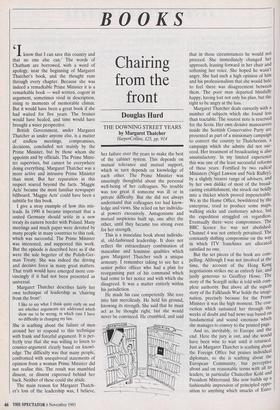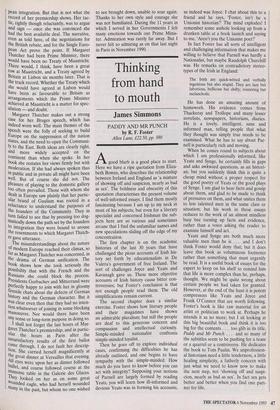BOOKS
Chairing from the front
Douglas Hurd
THE DOWNING STREET YEARS by Margaret Thatcher HarperCollins, £25, pp. 914 Iknow that I can save this country and that no one else can.' The words of Chatham are borrowed, with a word of apology, near the beginning of Margaret Thatcher's book, and the thought runs through every chapter. Because she was indeed a remarkable Prime Minister it is a remarkable book — well written, cogent in argument, sometimes vivid in description, rising to moments of memorable climax. But it would have been a great book if she had waited for five years. The bruises would have healed, and time would have brought a wiser perspective.
British Government, under Margaret Thatcher as under anyone else, is a matter of endless meetings, compromises, decisions, concluded not mainly by the Prime Minister, but by those whom she appoints and by officials. The Prime Minis- ter supervises, but cannot be everywhere doing everything. Margaret Thatcher was a more active and intrusive Prime Minister than most. But her reputation in this respect soared beyond the facts. 'Maggie Acts' became the most familiar newspaper billboard. 'Maggie Acts' could have been a subtitle for this book.
I give a stray example of how this mis- leads. In 1990 it became important that a united Germany should settle in a new treaty its eastern border with Poland. Many meetings and much paper were devoted by many people in many countries to this task, which was successful. The Prime Minister was interested, and supported this work. But the episode is described here as if she were the sole begetter of the Polish-Ger- man Treaty. She was indeed the driving and decisive force in many great matters. That truth would have emerged more con- vincingly if it had not been presented as universal.
Margaret Thatcher describes fairly her own technique of leadership as 'chairing from the front':
I like to say what I think quite early on and see whether arguments are addressed which show me to be wrong, in which case I have no difficulty in changing my line.
She is scathing about the failure of men around her to respond to this technique with frank and forceful argument. It is per- fectly true that she was willing to listen to counter-argument clearly based on knowl- edge. The difficulty was that many people, confronted with unequivocal _statements of opinion from a woman Prime Minister did not realise this. The result was mumbled dissent, or dissent expressed behind her back. Neither of these could she abide.
The main reason for Margaret Thatch- er's loss of the leadership was, I believe, her failure over the years to make the best of the cabinet system. This depends on mutual tolerance and mutual support, which in turn depends on knowledge of each other. The Prime Minister was amazingly thoughtful about the personal well-being of her colleagues. No trouble was too great if someone was ill or in private difficulty. But she did not always understand that colleagues too had know- ledge and views. She relied on her individu- al powers excessively. Antagonisms and mutual suspicions built up, one after the other, until they became too strong even for her strength.
This is a masculine book about individu- al, old-fashioned leadership. It does not reflect the extraordinary combination of masculine and feminine qualities which gave Margaret Thatcher such a unique armoury. I remember taking to see her a senior police officer who had a plan for reorganising part of his command which had come to her notice and with which she disagreed. It was a matter entirely within his jurisdiction.
He made his case competently. She tore into him mercilessly. He held his ground, knowing its strength. She said that he must act as he thought right, but she would never be convinced. He crumbled, and said that in those circumstances he would not proceed. She immediately changed her approach, leaning forward in her chair and softening her voice. She hoped he wasn't angry. She had such a high opinion of him and his professionalism that she would hate to feel there was disagreement between them. The poor man departed blissfully happy, having lost not only his plan, but the right to be angry at the loss.
Margaret Thatcher deals cursorily with a number of subjects which she found less than tractable. The sourest note is reserved for the Scots. Her own divisive manoeuvres inside the Scottish Conservative Party are presented as part of a missionary campaign to convert the country to Thatcherism, a campaign which she admits did not suc- ceed. Her treatment of broadcasting is also unsatisfactory. In my limited experience this was one of the least successful reforms of these years. Fortified by two radical Ministers (Nigel Lawson and Nick Ridley), by a slightly bizarre range of advisers, and by her own dislike of most of the broad- casting establishment, she struck out boldly into a thicket which proved impenetrable. We in the Home Office, bewildered by the enterprise, tried to produce some maps, walking sticks and cautionary advice, but the expedition struggled on regardless. Eventually there- were compromises. The BBC licence fee was not abolished. Channel 4 was not entirely privatised. The constantly shifting compromise on the way in which ITV franchises are allocated satisfied no one.
But the set pieces of the book are com- pelling. Although I was not involved at the time, the account of the Hong Kong negotiations strikes me as entirely fair, and justly generous to Geoffrey Howe. The story of the Scargill strike is told with com- plete authority. But above all the superb story of the Falldands War holds the imagi- nation, precisely because for the Prime Minister it was the high moment. The con- viction which sustained her through the weeks of doubt and bad news was based on fundamental and sound emotions which she manages to convey to the printed page. And so, inevitably, to Europe and the end. Here the jury is out, and she would have been wise to wait until it returned. Just as Margaret Thatcher is scathing about the Foreign Office but praises individual diplomats, so she is scathing about the European Community, but perceptive about and on reasonable terms with all its leaders, in particular Chancellor Kohl and President Mitterrand. She now builds up a fashionable impression of principled oppo- sition to anything which smacks of Euro-
pean integration. But that is not what the record of her premiership shows. Her tac- tic, rightly though reluctantly, was to argue and sign — once she was convinced she had the best available deal. The narrative, even as told here, of the negotiations for the British rebate, and for the Single Euro- pean Act prove the point. If Margaret Thatcher had been Prime Minister, there would have been no Treaty of Maastricht. There would, I think, have been a great row at Maastricht, and a Treaty agreed by Britain at Lisbon six months later. That is the track record. Whether the Treaty which she would have agreed at Lisbon would have been as favourable to Britain as arrangements which the Prime Minister achieved at Maastricht is a matter for spec- ulation — and doubt.
Margaret Thatcher makes out a strong ,.ase for her Bruges speech, which has indeed worn well. The main themes of the Speech were the folly of seeking to build Europe on the suppression of the nation states, and the need to open the Communi- ty to the East. Both ideas are clearly right, and more widely accepted on the Continent than when she spoke. In her book she restates her views firmly but with Moderation. If she had always spoken thus in Public and in private all might have been Well But of course she did not. The Pleasure of playing to the domestic gallery too often prevailed. Those with whom she dealt in Europe saw plainly that her partic- ular brand of Gaulism was rooted in a reluctance to understand the purposes of the founders of the Community. They in turn failed to see that by pressing too dog- Matically down the path set by the founders to integration they were bound to arouse the resentments to which Margaret Thatch- er gave utterance.
The misunderstandings about the nature of modern Europe reached their climax, so far as Margaret Thatcher was concerned, in the drama of German unification. The book shows how she took seriously the Possibility that with the French and the Russians she could block the process. Presidents Gorbachev and Mitterrand were Perfectly happy to join with her in gloomy fireside chats about the defects of German history and the German character. But it Was clear even then that they had no inten- 'non whatsoever of joining in some blocking manoeuvre. Nor would there have been any sense or long-term purpose in doing so.
shall not forget the last hours of Mar- garet Thatcher's premiership, and in partic- ular the hours in Paris after the unsatisfactory results of the first ballot c•nte through. I do not fault her descrip- tion. She carried herself magnificently at the great dinner at Versailles that evening. All eyes were upon her as dinner followed ballet, and course followed course at the Timense table in the Galerie des Glaces. they looked on her as on some great wounded eagle, who had herself wounded Many in the past, but whom no one wished
to see brought down, unable to soar again. Thanks to her own style and courage she was not humiliated. During the 11 years in which I served in her Governments I felt many emotions towards our Prime Minis- ter. Admiration was rarely far away. But I never felt so admiring as on that last night in Paris in November 1990.











































































 Previous page
Previous page